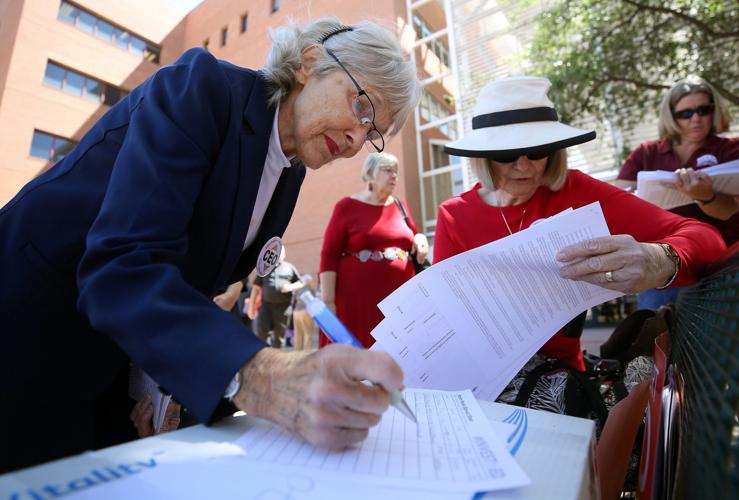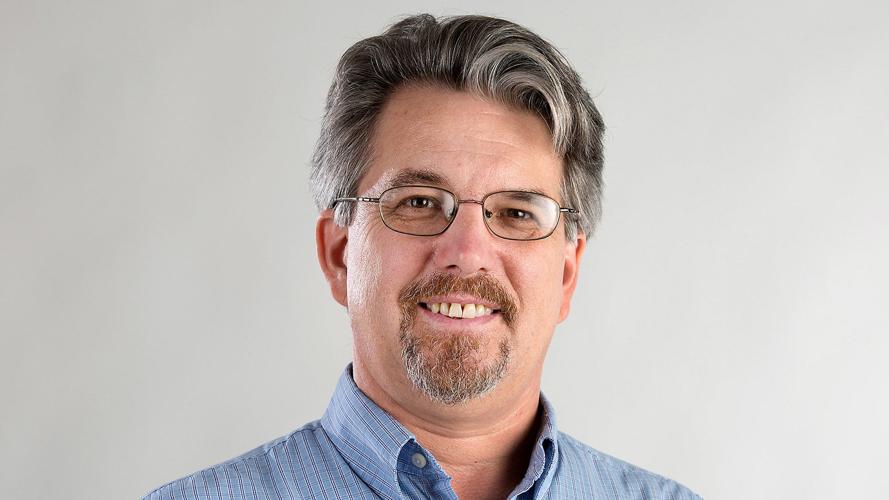Part way through the deposition of Jaime Molera, the man trying to kill Invest In Ed, a lawyer for the initiative campaign asked him a key question.
If the initiative passes, would the 3.5% surcharge it proposes apply to him personally?
Molera would not answer, said Roopali Desai, the lawyer who asked the question. Molera apparently didn’t want to reveal whether he makes $250,000 as a single person or $500,000 as part of a married couple. Those are the only people whom the initiative affects — Arizona’s wealthiest.
When he wouldn’t answer, Desai asked Maricopa County Superior Court Judge Christopher Coury to compel him to answer. We can’t know how that played out — Coury made that part of the deposition secret, Desai said.
Of course he did. In an egregious opinion issued Friday, Coury, who is himself a member of Arizona’s ruling class, took pains to defend his people against the people of Arizona.
Coury is a member of a family that has owned auto dealerships for decades — you may have heard of Tony M. Coury Buick in Mesa, which closed in 2005, or others bearing the Coury name around the state. Based on my analysis of political donations and property records, he owns a Phoenix-area home the full-cash value of which is listed at just over $1 million.
The property records do not bear anyone’s name, but the address is one he listed as his own on a separate record I came across.
In his ruling throwing the Invest in Ed initiative off the ballot, Coury embodied the disdain that Arizona’s rulers feel for the majority when they try to exercise their rights. In a footnote dripping with condescension, he wrote:
“The disappointing aspect of this case is that IIE (Invest In Ed) ignored the lessons provided by the Arizona Supreme Court in ... 2018. When a teacher specifically instructs a student exactly how to complete a math problem, and when the student disregards the instruction and does the math problem incorrectly on a future test, should the student receive a passing grade? The simple answer is no.”
He went on, “However, it is not unfair for a feeling of disappointment to arise based on the student’s performance because the student disregarded the teacher’s specific instruction. IIE can be described much like the student in this example.”
Coury, by the way, is an alum of the University of Notre Dame. He’s married to an attorney. His financial disclosure from 2016, the last year he was retained in an election, lists three different trusts of which he is beneficiary and a variety of retirement and other financial accounts.
“It’s unbelievable,” said Paul Bender, a longtime Arizona State University law professor and expert on Arizona’s Constitution. “He’s treating the petitioners as his students. And he’s the teacher, or the judges are the teachers.”
That’s not at all what the Arizona Constitution lays out, Bender noted. The state Constitution establishes the right to citizen initiatives before it even establishes the Legislature. It’s that fundamental to the state’s founding.
“The whole point of the direct democracy process is to go around the Legislature, to let the voters do something that the Legislature doesn’t want to do, or to do the opposite of what the Legislature does,” Bender said. “To let the Legislature start making the rules about how to go around the Legislature is contradictory.”
The rule he’s referring to is one that requires petitioners to write a 100-word summary on each petition that accurately encapsulates the initiative.
In Part II of our Editorial Board discussion, the three Democratic candidates for Pima County Attorney -- Laura Conover, Mark Diebolt and Jonathan Mosher -- talk about what differences set them apart, what being a Democrat means to them and how they'll lead the office if elected.
“None of this is appropriate,” Bender said. “His whole attitude is inappropriate.”
But of course, this is the attitude of Arizona’s rulers toward Arizona’s ruled. They know better, and they’ll be damned if they’ll let the majority even consider taxing them a bit more to pay for K-12 education. They don’t even want us to vote on it, even though 435,669 voters signed the initiative petitions.
What shocked David Lujan, one of the leaders of the Invest In Ed campaign, is how Coury adopted the “talking points” of Molera’s anti-initiative campaign, an effort called Arizonans for Great Schools and a Strong Economy.
For example, he adopted their contention that the 3.5% surcharge is actually a 77.7% increase, because it would bring Arizona’s top income tax rate, 4.5%, up to 8%. If you divide 3.5 by 4.5, you get 0.777, or 77.7%.
That’s an obvious error by Coury, though, because it misunderstands how the initiative works. The only income that is taxed more under the initiative is whatever a taxpayer makes beyond the thresholds. So, if a couple makes $501,000, they will only owe 35 extra dollars in taxes, because 3.5% of $1,000 is $35.
That’s less than a 1% increase.
But it’s some of the misinformation that the anti-initiative campaign, established by the Arizona Chamber of Commerce and Industry, is pitching.
Among the donors to the anti-initiative campaign is Don Brandt, the former Arizona Public Service CEO, who donated $25,000, and former vice president Dan Quayle, who donated $10,000. A variety of real estate companies have donated much of the rest of the money, Blandford Homes leading the pack with a $100,000 donation.
They don’t want us to have the right to interfere with their privileges. They have wrested that right away ever since voters passed the 2016 minimum wage initiative. They claimed it would be an economic disaster for Arizona, as they’re doing with this initiative, but the minimum wage has had almost no negative effects and did help increase wages at the lower end of the scale.
The Arizona Chamber, of which Molera is a board member, has successfully lobbied the Legislature to make it much harder to collect signatures and submit a valid petition.
In this case, Coury agreed with Molera’s side that the 100-word summary of the initiative was insufficient. But he used more than 100 words just to explain what else he wanted in the summary.
“It sets an impossible burden for any future initiative to meet,” Lujan said.
That is, of course, the point.
Now the Arizona Supreme Court justices, who threw the 2018 Invest In Ed initiative off the ballot, will hear an appeal of Coury’s ruling. If the pattern holds, they will uphold it — this is a court packed, thanks to the Legislature, by Gov. Doug Ducey, another proud member of the ruling class.
Our only hope is at the ballot box — throwing out all those who have tried to take away our constitutional powers. Maricopa County voters might want to start with Coury — he’s up for retention this year.
Photos: 2020 Primary Election in Pima and Maricopa counties
Primary Election in Pima County
Updated
An elections worker looks over a few of the early primary ballots at one of the scanning stations during counting at the Pima County Elections Center, Tucson, Ariz., August 4, 2020.
Primary Election in Pima County
Updated
A pair of elections workers look over an early primary ballot as part of the counting process at the Pima County Elections Center, Tucson, Ariz., August 4, 2020.
Primary Election in Pima County
Updated
Elections workers feed primary ballots in to scanners at the Pima County Elections Center, Tucson, Ariz., August 4, 2020.
Primary Election in Pima County
Updated
A poll worker waits inside the Pima County voting site at Morris K. Udall Recreational Center, 7200 E. Tanque Verde Rd., in Tucson, Ariz on August 4, 2020.
Primary Election in Pima County
Updated
Brad Nelson, left, Pima County elections director, helps Lisa Matthews, Pima County election marshal, put up a “Welcome Voters” sign after it was blown down outside of the Pima County voting site at Morris K. Udall Recreational Center, 7200 E. Tanque Verde Rd., in Tucson, Ariz on August 4, 2020.
Primary Election in Pima County
Updated
After voting, a voter walks back to their car at the Pima County polling site at Ellie Towne Flowing Wells Community Center, 1660 W. Ruthrauff Rd.., in Tucson, Ariz on August 4, 2020.
Primary Election in Pima County
Updated
A voter walks by a polling sign outside the Armory Park Center located at 220 S 5th Avenue during primary election day, on Aug. 4, 2020.
Primary Election in Pima County
Updated
Voters enter the Tucson Estates Multi-Purpose Hall located at 5900 W Western Way Circle, on Aug. 4, 2020.
Primary Election in Pima County
Updated
Gilbert Silva walks through the parking lot of the Valencia Library located at 202 W Valencia Road to cast his vote during primary election day, on Aug. 4, 2020.
Primary Election in Pima County
Updated
A poll worker (right) takes a completed ballot from a voter at the Valencia Library located at 202 W Valencia Road during primary election day, on Aug. 4, 2020.
Primary Election in Pima County
Updated
After placing their vote, a voter starts to place their "I Voted" sticker on their shirt as they leave the Pima County voting site at Temple Emanu-El, 225 N. Country Club Rd., in Tucson, Ariz on August 4, 2020.
Primary Election in Pima County
Updated
A poll worker wearing a face shield, mask and gloves walks outside to check if anyone needs assistance at the Pima County polling site at Ellie Towne Flowing Wells Community Center, 1660 W. Ruthrauff Rd.., in Tucson, Ariz on August 4, 2020.
Primary Election in Pima County
Updated
A voters arrives at the Pima County polling site at Ellie Towne Flowing Wells Community Center, 1660 W. Ruthrauff Rd.., in Tucson, Ariz to drop off their voting ballot on August 4, 2020.
Primary Election in Pima County
Updated
A voter leaves the Pima County polling site at Ellie Towne Flowing Wells Community Center, 1660 W. Ruthrauff Rd.., in Tucson, Ariz on August 4, 2020. Photo by Rebecca Sasnett / Arizona Daily Star
Primary Election in Maricopa County
Updated
A portrait of Ashlee King after she voted, August 4, 2020, at the El Tianguis Mercado polling place, 9201 S. Avenida Del Yaqui, Guadalupe.
Primary Election in Maricopa County
Updated
Anita Cota-Soto washes her hands before voting, August 4, 2020, at the El Tianguis Mercado, 9201 S. Avenida Del Yaqui, Guadalupe. Cota-Soto is a Town of Guadalupe councilmember running for re-election.
Primary Election in Maricopa County
Updated
Voting marshal Gerry Lamanski checks his watch before announcing the polls are open, August 4, 2020, at the Tempe History Museum, 809 E. Southern Ave., Tempe.
Primary Election in Maricopa County
Updated
People vote on Election Day at Nueva Vida Church in Scottsdale on Aug. 4, 2020.
Primary Election in Maricopa County
Updated
Voters walk to a polling station to cast votes for GOP and Democratic candidates for the primary election Tuesday, Aug. 4, 2020, in Chandler, Ariz. (AP Photo/Ross D. Franklin)
Primary Election in Maricopa County
Updated
Voters walk to a polling station to cast votes for GOP and Democratic primary candidates Tuesday, Aug. 4, 2020, in Chandler, Ariz. (AP Photo/Ross D. Franklin)
Primary Election in Maricopa County
Updated
A voter wearing a face covering exits a polling station to cast votes for GOP and Democratic primary candidates, as a polling station workers opens the door for voters Tuesday, Aug. 4, 2020, in Chandler, Ariz. (AP Photo/Ross D. Franklin)
Pima County Attorney candidates sit down with our Editorial Board, Part II
In Part II of our Editorial Board discussion, the three Democratic candidates for Pima County Attorney -- Laura Conover, Mark Diebolt and Jonathan Mosher -- talk about what differences set them apart, what being a Democrat means to them and how they'll lead the office if elected.





